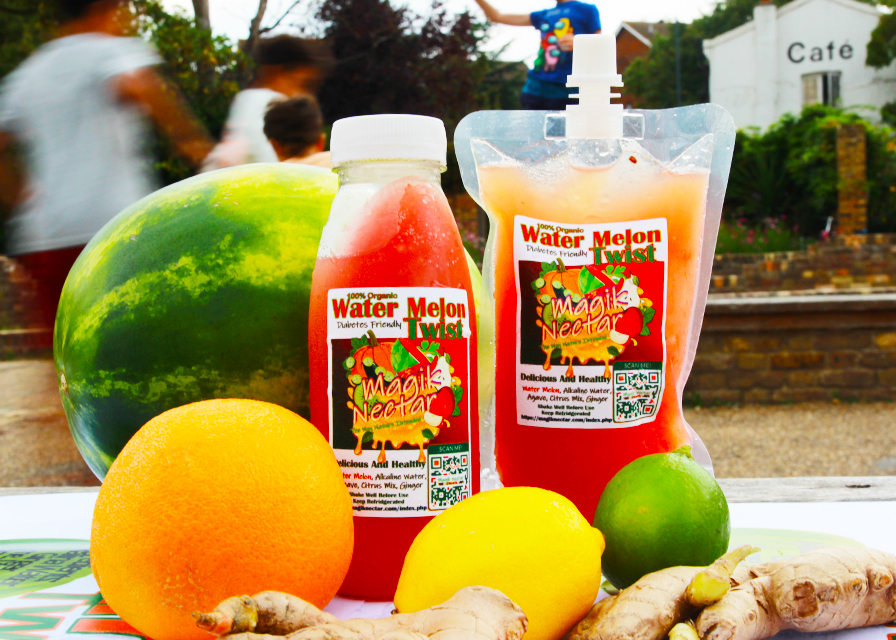Product Details

Benefits
100% Natural Water Melon Juice
Alkaline Water
100% Natural Citrus Juice Mix
100% Natural Ginger Juice
Agave Nectar
Gluton Free
Vegan Friendly
No Sugar

Water Melon Twist £2.50
-
Best Quality
Standards -
Natural Healthy
Products -
The Smart
Choice
Our choices of Juice Twists were not randomly selected. The team at Magik Nectar is of the opinion that people’s immune systems are severely compromised as a result of poor dieting choices due to widespread ignorance relating to food. Simply put; we are ignorant about what our bodies require to perform at their optimum. The Magik Nectar range of Juice twists were selected specific... read more
Choose Juice Size:
Choose Quantity
-
Best Quality
Standards -
Natural Healthy
Products -
Smart Oragnic
Services
Our choices of Juice Twists were not randomly selected. The team at Magik Nectar is of the opinion that people’s immune systems are severely compromised as a result of poor dieting choices due to widespread ignorance relating to food. Simply put; we are ignorant about what our bodies require to perform at their optimum. The Magik Nectar range of Juice twists were selected specifically to address our immune requirements. We Satisfy Your Taste Buds And Your Body’s Nutritional Needs.
The cheery red color comes from lycopene, an antioxidant. Studies show it may help curb your risk of cancer and diabetes as part of a healthy lifestyle. Watermelon has more of this nutrient than any other fruit or veggie -- even tomatoes. To load up on lycopene, choose a melon with bright red flesh rather than yellow or orange. And the riper, the better. Also, seedless melon tends to have more lycopene than those with seeds.
Some pigments help protect plants from the sun. Oddly enough, just eating them may shield your skin, too -- at least a little. The lycopene in watermelon may make it less likely that you get sunburned. But that’s not for sure, so keep using your broad-spectrum sunscreen with SPF of 30 or higher every day.
Watermelon is rich in an amino acid called citrulline that may help move blood through your body and can lower your blood pressure. Your heart also enjoys the perks of all the lycopene watermelon contains. Studies show that it may lower your risk of heart attacks. Of course, your whole lifestyle affects your heart health. So make sure you also work out, don’t smoke, limit saturated fat, and keep up with your doctor’s advice.
Watermelon has a natural pigment called beta-cryptoxanthin that may protect your joints from inflammation. Some studies show that over time, it could make you less likely to get rheumatoid arthritis.
Just one medium slice of watermelon contains 9-11% of the vitamin A you need each day. This nutrient is one of the keys to keeping your eyes healthy. Foods are the best ways to get all the vitamins and minerals that your body needs.
Juicy watermelon is 92% water, so it’s a simple way to help stay hydrated. Every cell in your body needs water. Even a small shortage can make you feel sluggish. If you get really dehydrated, it can become serious enough that you need to get fluids by IV.
Vitamins A, B6, and C in watermelon help your skin stay soft, smooth, and supple. Because it’s loaded with water, melon also makes a great face mask. Mix 1 tablespoon of watermelon juice with the same amount of Greek yogurt. Spread over your face and leave on for 10 minutes to slough off any dry, dull skin. Rinse and pat dry.
A cup of ice cream will set you back around 300 calories. You can enjoy the same amount of watermelon for just 45.6 calories. And unlike many other desserts, it’s fat-free, cholesterol free, and has no sodium. Plus, the water in it will help you stay fuller longer. To make an easy sorbet, puree some watermelon in your blender, add a squeeze of lime, and pop in the freezer until it hardens.
Watermelon’s high water content, antioxidants, and amino acids may make for a better workout. It’s also high in potassium, a mineral that could cut down on cramps at the gym. You can sip watermelon juice after you sweat, too. Doing so could help prevent muscle soreness, as long as you don’t push yourself too hard.
If you have a digestive condition like Crohn’s or colitis, the list of what not to eat during a flare can be long. You can put watermelon on your “yes” list. Its soft, fleshy fruit is easy for even an inflamed gut to digest. (Just don’t eat the rind or the seeds if you need to limit fiber.)
You may have been told as a kid that if you swallow watermelon seeds, they’ll grow in your belly. Not true! After all, your stomach has no sunlight or soil, and a lot of gastric acid. Many melons are seedless these days, but don’t worry if you do swallow a seed. They’re actually full of nutrients!
Pick a melon that’s free of dents, nicks, and bruises. Look for a yellow, not white, spot on the bottom. This signals that it’s ripe. A juicy, ready-to-eat watermelon will feel heavy for its size. When you thump it, it should sound hollow.
Wash the outside of your melon before you slice into it. You don’t want your knife to transfer any germs to the inside. While melon tastes best right after it’s cut, you can store it in your fridge for up to 5 days. Freezing is an option, too. While the watermelon won’t stay crisp, you can thaw it to use in smoothies.
A slice of fresh watermelon tastes great, but you can do more with it. Top a salad with cubed melon and crumbled feta cheese. Make a watermelon pizza by topping wedges with yogurt, mint, slivered almonds, and berries. And save the seeds! Tossed with olive oil and sea salt, they can be roasted for a tasty (and healthy) snack.

